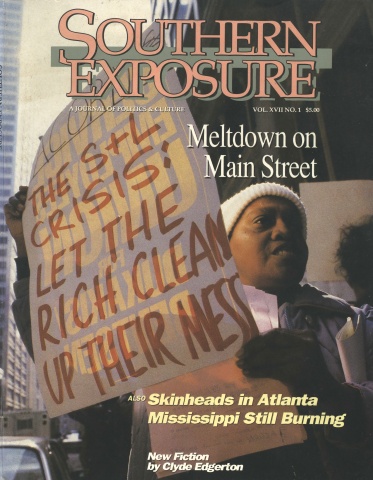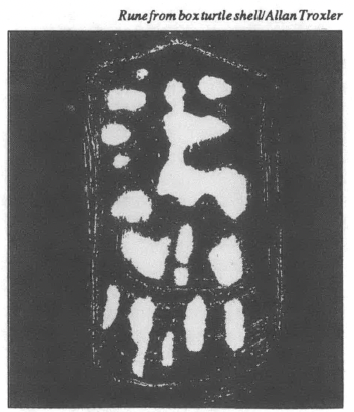
This article originally appeared in Southern Exposure Vol. 17 No. 1, "Meltdown on Main Street." Find more from that issue here.
My friend Robert Lynch — “Rabbit” — died last week of AIDS. This past summer he gracefully endured several long interviews for an issue of Southern Exposure on gay and lesbian life. His strength was ebbing and his libido was shot, but still he loved more than anything to hold forth, and on those afternoons we would get swept along by his passions and his crazed digressions (“Did this guy really go to Harvard Law School?”), and before long, the lightning bugs would be blinking in the cedar trees.
At the funeral in a country church filled with his aunts and uncles and his double-first and double-second cousins, an old woman rose up behind the vast bank of chrysanthemums and carnations and said, emphasizing each word, “Robert was different. Robert was special. We march to a different drummer. Robert marched to a drummer of his own making.”
Indeed, among the gaits and cadences of his various people — the native tribal family, the big-city gay scene, rural black communities, the art and dance worlds, the Southern left — he conjured up a rhythm all his own. And he would prance back and forth, paradoxical and stubborn, throwing folks out of step and laughing. Rabbit, the Trickster.
On my desk a book is open to a haunting photograph, a portrait of Running Fox — “one of the few members of his tribe to survive the smallpox epidemic of 1837.” A devastating disease, government duplicity, apathy over the destruction of an “inferior” culture — I stare at this handsome, impassive face and ponder the familiar and unswerving cruelty of the corporate state. AIDS research and education efforts are hobbled by petty competition and congressional neglect; Burroughs Wellcome continues its profiteering with AZT; and 60 percent of those surveyed feel no sympathy for people with AIDS.
(Robert, gaunt and stooped in his elegant Goodwill duds, slouches in a chair at the welfare office in Rocky Mount where he will wait all morning to get gas money to drive to Durham for his weekly doctor’s appointment.)
They may choose not to know it, the 60 percent, but many, many of the caretakers of our collective humanity — our shamans, our fairies — are dying off. Musicians, children’s-book writers, poets, gardeners, nurses, third-grade teachers, dancers.
In some towns, during the worst of the plague years in the 17th century, the knell-ringing became so unrelenting that the bells wore out. Here in the South, we can ignore the passing bell: Over the years, multitudes of our gay sons and brothers have fled the intolerance and isolation and now are dying far away, where the bells are beginning to crack.
“Sometimes I’m totally baffled by the way life jerks you around, brings you back around,” Robert said offhandedly. “That’s one of the biggest ironies, that I’m back — in the house I grew up in.” In fact, it was an extremely courageous decision for a queer, randy aborigine committed to social justice, sporting a boutonniere and writing poetry, to come home to Halifax County, North Carolina.
Occasionally, with a flourish of exasperation, he would declare “I gotta get out of here! ” and he’d disappear to the tony purlieus of DC or New York for r&r. But soon he would be back, to do what he could for prisoners on death row, to encourage “outsider” artists in their unschooled, eloquent work, to cruise the crossroads poolhalls and to record the history of his family.
Here, in the quiet of his grandmother’s room off the parlor, the boy had discovered “the eternal world where you suspend disbelief. The world where art exists.” He wept when he told me. In part, I think, because it would make the life of the uncompromising artist very hard at times, staying at home, listening to the voices.
We stood quietly among the gravestones. The warm March breeze riffled the funeral home awning. In front of me a woman in high heels teetered in the red clay.
“The smell of fresh-turned earth in the spring—it’s a transporting smell,” Robert, the sharecropper’s son, had said. “The deep earth that’s turned over in the springtime when you break the land, there’s nothing like that smell.”
Standing among the old women who had made the quilts that Robert treasured, I thought back to DC last October, when I wandered out on the endless quilt that was stitched by thousands of hands in memory of people who had died of AIDS. Over 8,000 panels, each 3’x 6’, covered the Ellipse in front of the shuttered White House.
I would like to sew a panel for Robert. Perhaps there will be the rough orange of the fresh-turned earth in the family graveyard, and the electric green of the winter wheat that flashed past in the late afternoon light as we drove back from the funeral. There could be sassy old silk ties and ’40s herringbones and lots of stolen flowers (a penchant we shared). The chiaroscuro of work-sculpted back and ass and calves. And a few elliptical words, from Robert’s poetry perhaps, to describe and perplex.
If you would like to help, let me know.
Tags
Allan Troxler
The author lives and works in Durham, North Carolina. His interview with Robert Lynch, entitled “Rabbit," appeared in the Fall 1988 issue of Southern Exposure. (1988)
Allan Troxler is a dancer and artist in Durham, North Carolina. (1988)
Allan Troxler is a staff member of the Institute for Southern Studies. (1979)

